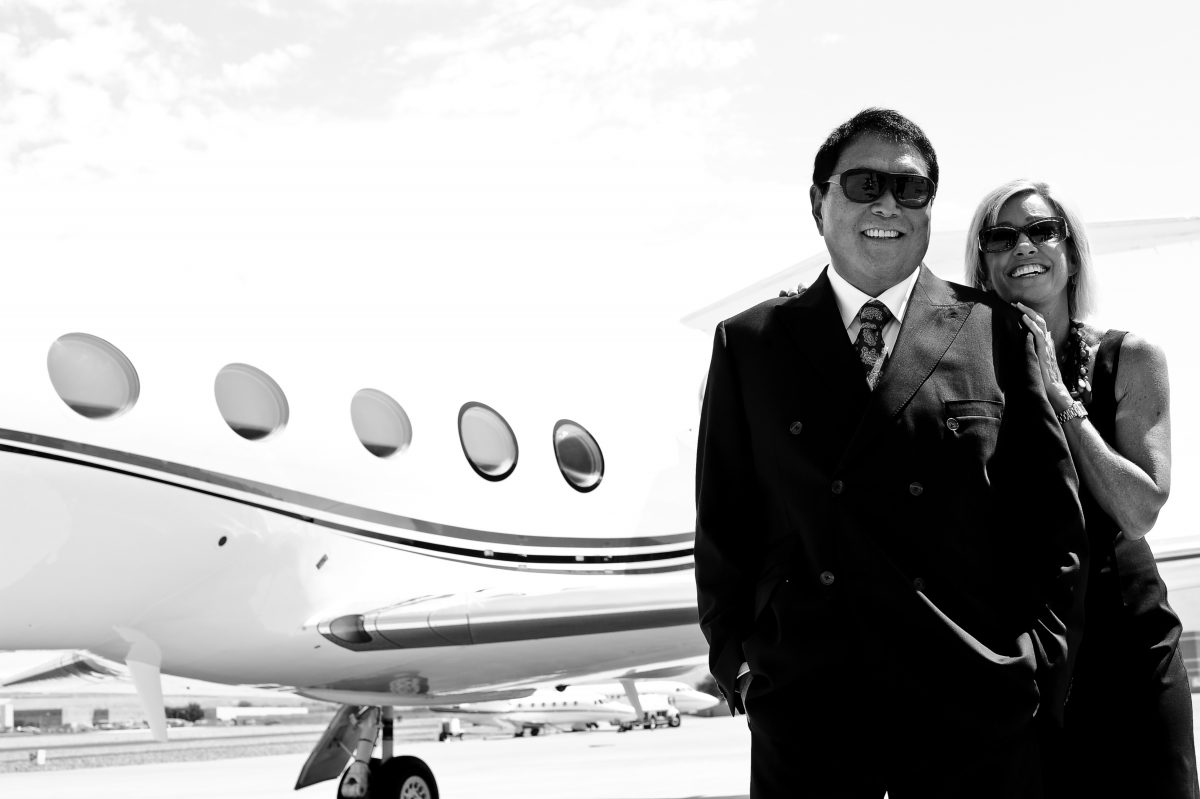
By Mona Gambetta
Have you ever wondered why some of life’s experiences are etched so vividly in our memories?
Incredibly clear and sharp—and as real, in our mind’s eye—as the day they occurred? Why are some experiences so much more memorable than others . . . more powerful or emotionally-charged or meaningful? A recent conversation with Robert Kiyosaki about a meeting in New York City, more than a decade ago, triggered that very question . . .
I can’t recall precisely how our conversation moved to a meeting Robert had with Donald Trump in January of 2007. It was a meeting I sat in on and one that had been scheduled for a very specific reason.
In my role in support of Robert’s book projects, I was often in meetings about books—and meeting with Donald Trump and his team about the books he and Robert have written together. In this particular one, I felt very much like the proverbial ‘fly on the wall’ because Robert had come to Trump Tower on a mission and I was there to support it—and him.
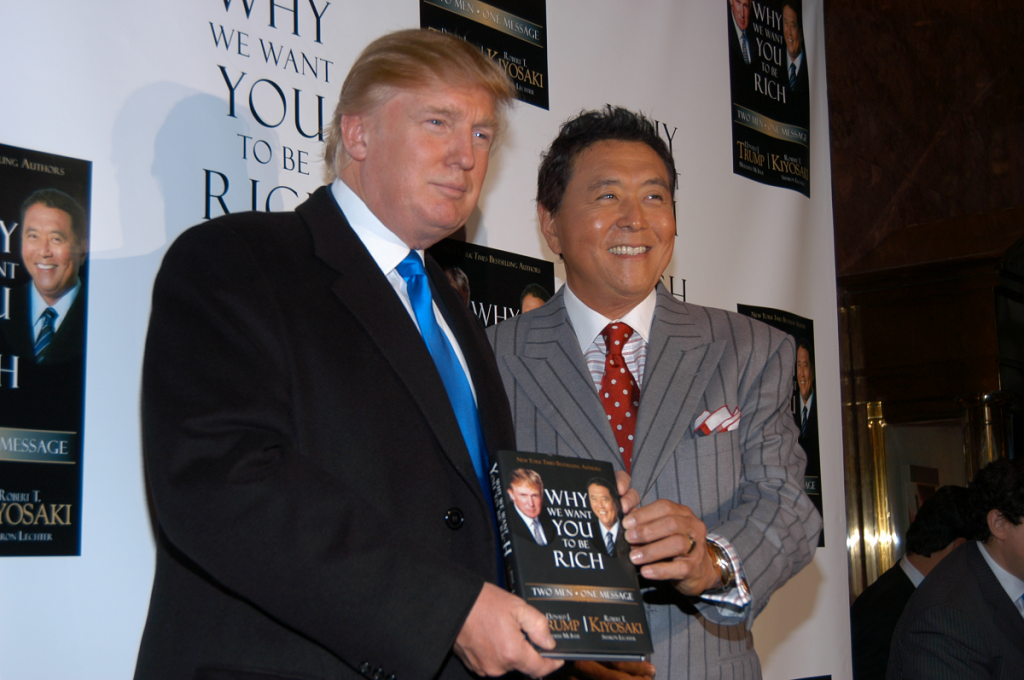
The timing was early January in 2007. The place: Donald Trump’s office in Trump Tower in NYC. And while meetings between Robert and DJT weren’t unusual—they have shared the stage at events around the world and have written two books together—this meeting was different.
And—did I mention this?—Robert had a check in his pocket (made out to Donald Trump) for $1 million.
I hadn’t planned to get into too much ‘history’ here, but a bit of backstory is important.
The two men met in the green room at a large-stage event at which Robert was introducing Donald Trump. Robert expressed his respect for a guy who had built an international real estate empire and leveraged his brand into a global powerhouse . . . and authored a book (The Art of the Deal) that showcased his approach to deal-making. When they were introduced, I remember Trump pursing his lips, nodding his head, and congratulating Robert on the phenomenal success of Rich Dad Poor Dad, the book that had become the number one personal finance book of all time and has sold tens of millions of copies worldwide. At some point, the idea that “we should write a book together” was floated . . . and that thought took on a life of its own—in the form of Why We Want You to Be Rich.
In October of 2006, Robert and DJT released that book, the first of their two co-authored books. The launch party at Trump Tower buzzed with dozens of international journalists as well as Steve Forbes, who wrote the endorsement ‘blurb’ on the back of the book jacket. Why We Want You to Be Rich hit The New York Times bestsellers list at #1 the week it was published and by the end of that year, the book had sold more than 500,000 copies. Nice payday for the author-partners, even though the revenue from book sales was only one small part of their businesses and revenue streams.
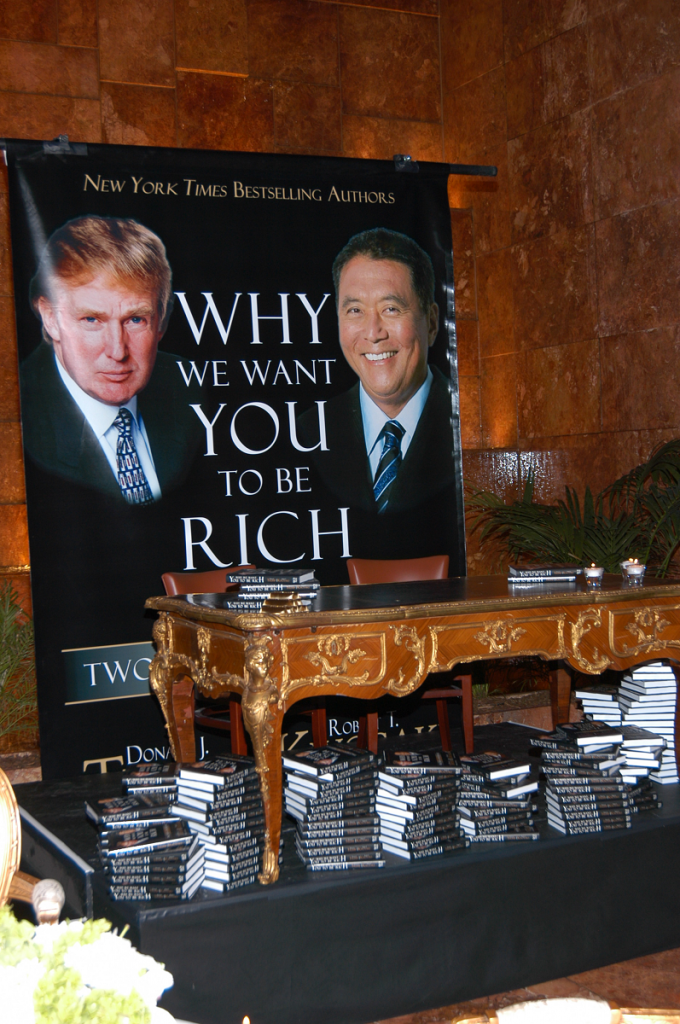
The event that really sets up that meeting between the two icons the following January was the fact that our book distributor at the time filed for bankruptcy protection on the last day the year in 2006. How that would all shake out (and it did, in a not-so-horrible way . . .) is immaterial to this story. I should mention, though, that DJT was not totally in favor of the publishing path we had chosen for their first book together, but his respect for Robert and the sustainability of Rich Dad Poor Dad sealed the deal. I’m sure that conversation, nearly a year prior, was on my mind and colored my expectations for that January meeting . . .
What is important is that there was ‘royalty’ money due to be paid to Donald Trump in January. And Robert and his wife Kim had a decision to make.
That’s where this story starts . . .
After boarding a plane in Phoenix with Robert, headed to NYC, he pulled a piece of paper from the inside breast pocket of his sport coat. He unfolded it, looked at it, and put it back in his pocket. He patted his chest, confirming to me that he had what we needed for the meeting he had planned.
“Do we have an envelope for that check?” I asked him. He shook his head. We had another 24 hours before Robert would hand over that check and it (already) wasn’t quite as ‘crisp’ as I hoped it might be . . . but that’s neither here nor there . . .
The following morning, we sat across the desk from Donald Trump. After a bit of small talk between the two, Robert explained the reason for their meeting. He recounted some of the backstory I shared earlier in this piece and explained how the unexpected turn of events with our book distributor would impact future distribution and sales of their book. Trump listened and nodded, but—as I recall—said relatively little. He did remind us that he had some reservations, early on, in terms of the overall publishing play, but more to remind us of his concerns (it seemed) than as recrimination or blame. They’d stay in touch on how things unfolded, they agreed, and Robert assured his co-author that we were already exploring several options that would keep the book distribution channels open in support of ongoing book sales and the licensing of global rights. Then Robert reached into his pocket and pulled out the (less-than-pristine) check, still folded in half.
Robert reached across Trump’s desk to hand him what must have looked more like a folded piece of paper than a check. DJT unfolded it, looked at it, nodded his head and then folded the check again, running his fingers along the crease. He didn’t say a word. Then he unfolded the check again, looked at it (again), folded it (again) and put it on the desk in front of him. He looked at Robert and asked, “Is this a hardship?”
At the time I recall thinking that of all the comments Donald Trump might have made and I would never have anticipated that one. I remember thinking, Well, isn’t that an interesting take on this business arrangement?
Robert didn’t miss a beat and cut right to the chase: “We had a deal. And a deal’s a deal.” He assured DJT that he and his team would work through this unexpected speedbump and the terms of their deal would be honored. It was my impression that Trump was more focused on the ‘deal’—and the relationship it was based upon—than the $1 million check that sat on the desk between them.
So I wasn’t surprised when he asked again, “But is this a hardship?” To which Robert replied: “Thank you. No. A deal’s a deal. And you can count on more book sales and more revenue checks.”
As that ‘fly on the wall,’ it was interesting to see these two men—both men of relatively few words—display this show of respect, respect for each other and respect for the business deal they had made. I realized that the situation in which both men found themselves was a test of character—for each of them—and as I was witness to two examples of both character and strength, I was reminded that great lessons, in business and in life, are all around us if we’re watching for them. And, without a doubt, this was one of the most memorable of my business life.
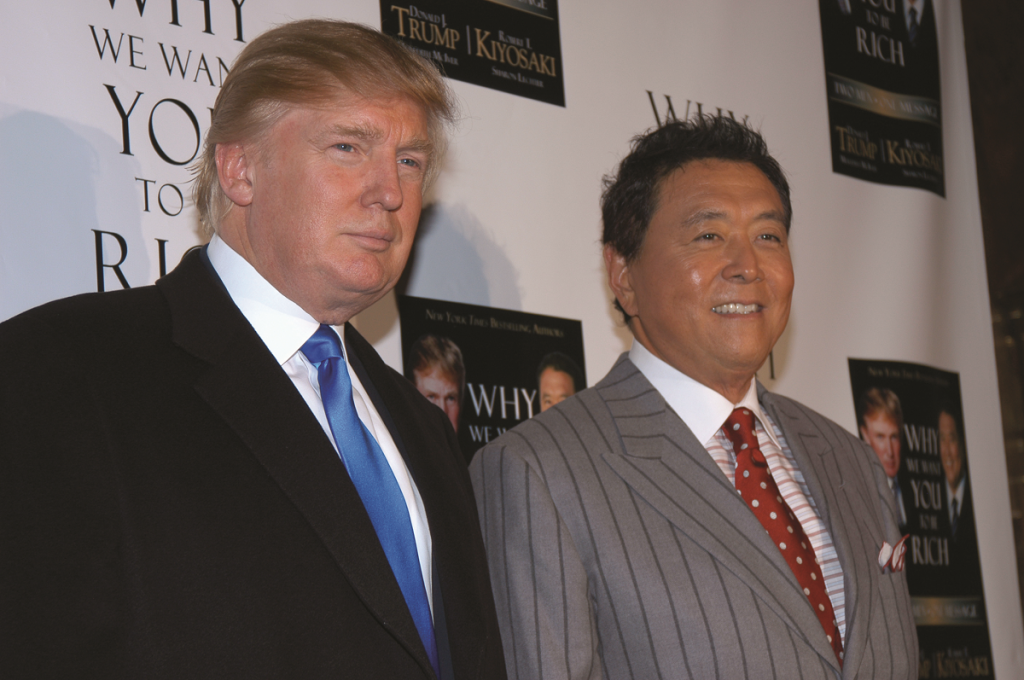
But what I remember most—and what Robert and I talked about that led to this article—is that so often we’re so sure we know what to expect. I could have cited a half dozen things DJT might have said to Robert, based on prior meetings and conversations and the current state of affairs related to their first book. (Including: “I told you so.”) The fact that I never imagined that conversation to play out as it did has been a lesson that has stayed with me for more than a decade. As has the realization that I had made some assumptions that never even came into play. I was struck by what that said—about both men—and felt fortunate to have worked with and learned from both of them.
It would be quite the understatement to say that Donald J. Trump—as today’s U.S. President and as a businessman for decades prior to that—has surprised more than a few people in ways large and small. His reaction that day a decade ago surprised me in a way I had never expected. And the impact of that unexpected perspective—and his question—has stayed with me as I’ve watched his life take a path that led him to the White House. Some might say that meeting was an uncharacteristic moment. Others, a glimpse into his true character. In any case . . . it was one of those experiences that has stayed with me as a reminder that we don’t always see—or get—what we expect in life. In fact, what fun would life be without a few surprises now and then? My hour with Robert Kiyosaki and Donald Trump at Trump Tower that day made a powerful impression on me, a reminder that we can’t always predict how anyone will react to adversity or challenges or unintended consequences. And the pivotal role that character plays in decisions, actions, reactions and outcomes.
One thing I can say with confidence is that I wasn’t the first person who’s been surprised by Donald Trump’s perspective and actions. Nor, quite likely, will I be the last. And the lesson for all of us might be found in the words attributed to the Greek philosopher Heraclitus: character determines destiny. That story will be one for the history books.
Mona Gambetta is the Director of Global Publishing for Plata Publishing, publisher of the Rich Dad series and the two Trump/Kiyosaki books, Why We Want You to Be Rich and Midas Touch, and has worked with Robert on his books and book publicity for nearly 20 years.
By Robert Kiyosaki
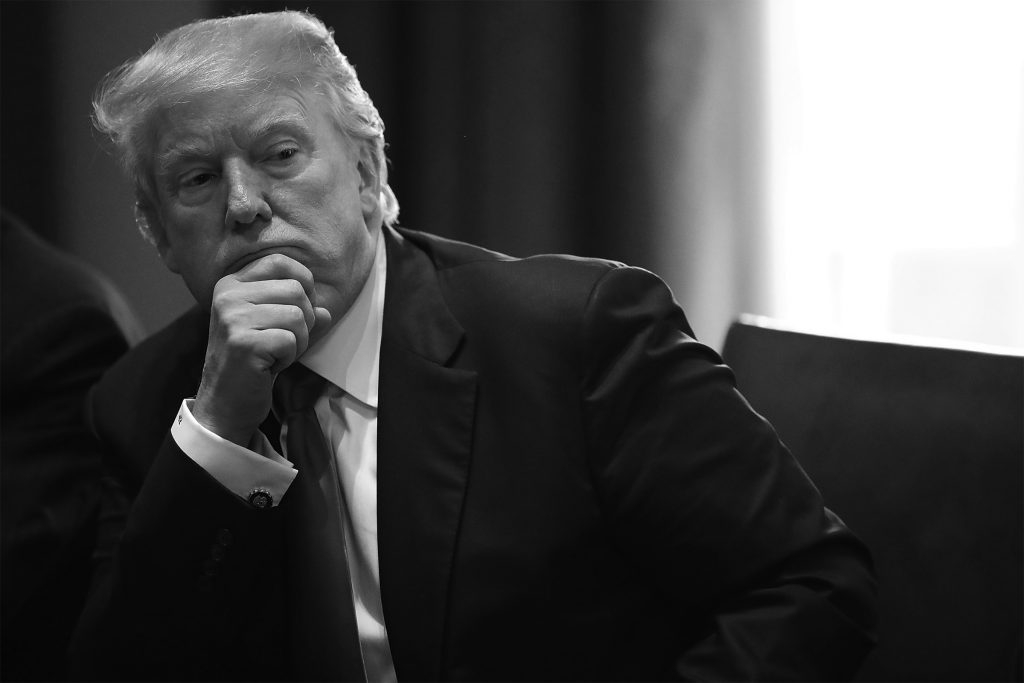
People either love President Donald Trump or they hate him.
If you hate him, this article probably is not for you. If you want to learn more about a man who became the U.S. President, this article will share an insight into the most powerful man in the world, and one few people will ever see.
I met Donald Trump before he became President Trump. We met as teachers, two men, both with rich dads . . . rich dads who were our teachers. I met “The Donald” backstage in a green room, when we were doing a number of mega-real estate investment events. The largest event we did together was in San Francisco for over 65,000 people, all seeking wisdom and knowledge about real estate investing and a path to a better life.
We met as teachers, not politicians, because we had two shared concerns: the growing gap between the rich and the poor and shrinking middle class and the lack of financial education in our schools. Neither of us could fathom that few if any schools offered a ‘class’ on the education we received from our rich dads.
While I do not agree with everything President Trump does or tweets, I did learn to respect the man during the eight years of speaking events and co-authoring two books together. We were in the process of writing a third book when he called to let me know the book deal was off and that he was running for President of the United States.
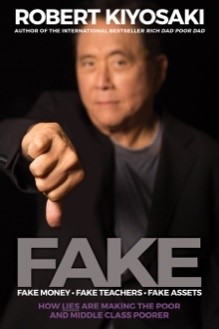
When Mona and I talked about this article for Jetset, of course I said “Yes.” Mona was with me every step of the way, and she witnessed things few people will know, things learned during the process of working with a future President of the United States.
Whether you love or hate the President, the purpose of this article is to give you a glimpse into the true character of a man who, today, is the most powerful man in the world.
Robert Kiyosaki, the author of Rich Dad Poor Dad and 28 other books in the Rich Dad series, has challenged and changed the way tens of millions of people around the world think about money and their financial future. With perspectives that often contradict conventional wisdom, Robert has earned a reputation for straight talk, irreverence and courage. He is regarded worldwide as a passionate advocate for financial education.
Robert’s new book—FAKE—goes on sale April 9.

